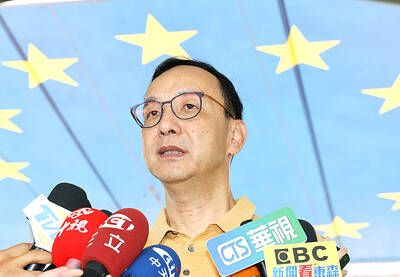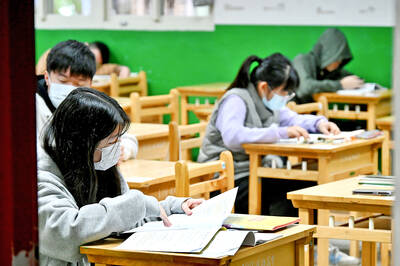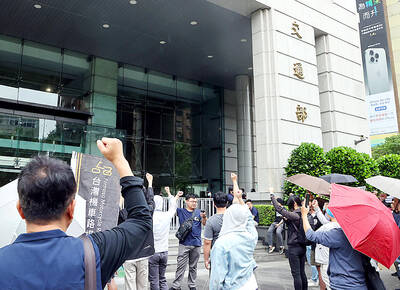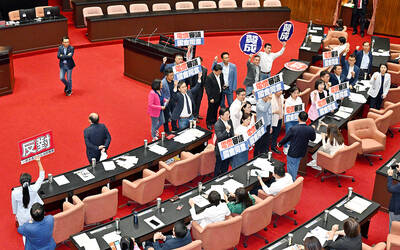Environmental groups yesterday urged the Council of Agriculture (COA) and the Ministry of the Interior to clarify their procedures for the removal of illegal facilities on farmland.
Premier Lin Chuan (林全) last month said that demolishing 286 illegal factories built after May 20 last year was the government’s priority.
The Environmental Rights Foundation and other groups yesterday organized a workshop in Taipei, inviting officials to clarify their respective roles in the plan.
The agencies had decided to categorize illegal facilities built after May 20 last year into those under construction and those already built, Construction and Planning Agency senior technical specialist Yang Zhe-wei (楊哲維) said.
Developers building factories are to be required to halt construction and demolish their facilities before a given time, or the government would forcibly remove them, he said, citing the Building Act (建築法).
Owners of finished factories would face fines of between NT$60,000 and NT$300,000 (US$1,985 and US$9,927) and would also be given a deadline for removal, Yang said, adding that in line with the Regional Plan Act (區域計畫法, their electricity and water supply could be cut off if they do not obey.
The demolitions would be carried out by local governments, Yang said, adding that all the necessary regulations were in place.
Citizen of the Earth, Taiwan researcher Pan Cheng-cheng (潘正正) asked if the COA and the ministry could establish clear standards for implementation, as different agencies appeared to have applied inconsistent criteria in the past.
“We have passed our standard operating procedures to local agencies,” COA technical specialist Tang Chen-hsin (唐晨欣) said.
While demolishing a built factory could cost about NT$2 million, cutting power and water supply as a first measure is more cost-efficient, she said.
Forcible removal would follow if an owner is fined for two or three consecutive rounds, Tang said.

GOOD DIPLOMACY: The KMT has maintained close contact with representative offices in Taiwan and had extended an invitation to Russia as well, the KMT said The Chinese Nationalist Party (KMT) would “appropriately handle” the fallout from an invitation it had extended to Russia’s representative to Taipei to attend its international banquet last month, KMT Chairman Eric Chu (朱立倫) said yesterday. US and EU representatives in Taiwan boycotted the event, and only later agreed to attend after the KMT rescinded its invitation to the Russian representative. The KMT has maintained long-term close contact with all representative offices and embassies in Taiwan, and had extended the invitation as a practice of good diplomacy, Chu said. “Some EU countries have expressed their opinions of Russia, and the KMT respects that,” he

CHANGES: After-school tutoring periods, extracurricular activities during vacations or after-school study periods must not be used to teach new material, the ministry said The Ministry of Education yesterday announced new rules that would ban giving tests to most elementary and junior-high school students during morning study and afternoon rest periods. The amendments to regulations governing public education at elementary schools and junior high schools are to be implemented on Aug. 1. The revised rules stipulate that schools are forbidden to use after-school tutoring periods, extracurricular activities during summer or winter vacation or after-school study periods to teach new course material. In addition, schools would be prohibited from giving tests or exams to students in grades one to eight during morning study and afternoon break periods, the

Advocates of the rights of motorcycle and scooter riders yesterday protested in front of the Ministry of Transportation and Communications in Taipei, making three demands. They were joined by 30 passenger vehicles, which surrounded the ministry to make three demands related to traffic regulations — that motorcycles and scooters above 250cc be allowed on highways, that all motorcycles and scooters be allowed on inside lanes, and that driver and rider training programs be reformed. The ministry said that it has no plans to allow motorcycles on national highways for the time being, and said that motorcycles would be allowed on the inner

AMENDMENT: Contact with certain individuals in China, Hong Kong and Macau must be reported, and failure to comply could result in a prison sentence, the proposal stated The Chinese Nationalist Party (KMT) and the Taiwan People’s Party (TPP) yesterday voted against a proposed bill by Democratic Progressive Party (DPP) lawmakers that would require elected officials to seek approval before visiting China. DPP Legislator Puma Shen’s (沈伯洋) proposed amendments to the Act Governing Relations Between the People of the Taiwan Area and the Mainland Area (臺灣地區與大陸地區人民關係條例), stipulate that contact with certain individuals in China, Hong Kong and Macau should be reported, while failure to comply would be punishable by prison sentences of up to three years, alongside a fine of NT$10 million (US$309,041). Fifty-six voted with the TPP in opposition